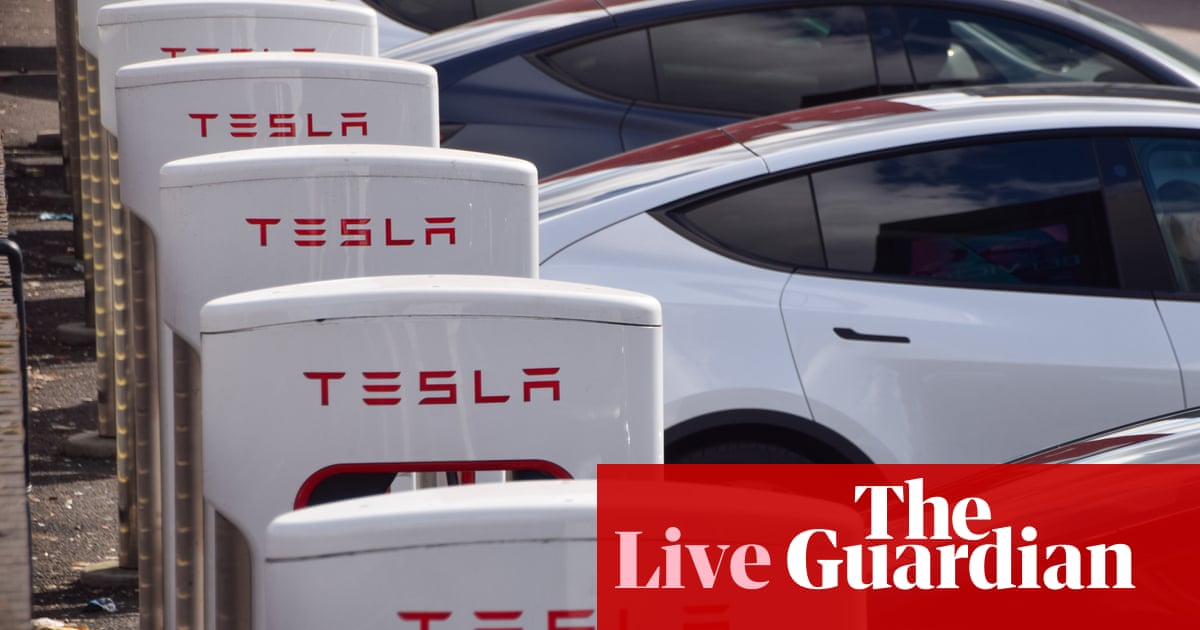Food inflation in the UK has risen for the fourth month in a row, figures show, driven by increases in the cost of fresh produce, including steak.
The annual rate of food price rises hit 2.8% this month, after a 2.6% rise in April, according to the latest shop price data from the British Retail Consortium (BRC).
However, prices overall remained in deflation – 0.1% cheaper than a year ago and unchanged from last month – with the cost of non-food goods falling, particularly for electricals as retailers cut prices to drum up business before apotential hit from Donald Trump’s tariffs.
Last night the EU’s trade commissionerMarosŠefčovičsignalled that the bloc was “fully committed” to reaching a trade agreement with the United States.
Šefčovičposted on X last night that he had had “good calls” with US commerce secretary Howard Lutnick and US trade representative Jamieson Greer, and that the European commission “remains fully committed to constructive and focused efforts at pace” towards an EU-US deal.
More car news: Japanese manufacturer Toyota is moving some production of its GR Corolla sports car to Britain.
According toReuters, Toyota will spend around $56m on a dedicated production line at its Burnaston plant in Derbyshire, to produce 10,000 cars annually for export to North America from the middle of 2026.
Reutersreports:
Reuters adds that the Burnaston site has suffered a decline in production since Brexit.
The news should cheer the UK government, as it
There’s a sense of relief in the financial markets after Donald Trump delayed his threatened 50% tariffs on all European Union imports into the US.
Trump had shocked investors last Friday when he announced he planned a 50% tariff on EU imports from the start of June.
But following a call with European Commission president Ursula von der Leyen, that hike in levies has been delayed until 9 July, to give both sides more time to negotiate.
Stocks are set to rally in London today, with Wall Street also set to rise, as trading resumes after the bank holiday break
Yesterday, France’sCACindex rose by 1.2% while Germany’sDAXgained 1.7%, and the euro hit a one-month high against the US dollar.
Tony Sycamore, market analyst atIG,reports that “risk sentiment improved” after Trump announced the delay to his 50% tariffs on the EU.
Ipek Ozkardeskaya, senior analyst atSwissquoteBank, cautions that market rallies are on “thin ice”. She explains:
Good morning, and welcome to our rolling coverage of business, the financial markets and the world economy.
Tesla’ssales across Europe halved last month, as the backlash against Elon Musk continues to hurt his electric car company.
The latest sales figures from industry body ACEA, released this morning, show that sales ofTeslacars fell by 52% year-on-year in the European Union in April, down to 5,475 units, from 11,540 a year before.
They fell 49% in the wider “EU + EFTA + UK” area.
The decline follows falls in Tesla sales in Europe in January, February and March, suggesting Musk’s controversial politics and association with the Trump White House are hurting the brand’s popularity, asanti-Musk protestshave popped up at Tesla showrooms this year.
The overall EU car market grew slightly in April,ACEAreports, with new car registrations rising by 1.3% year-on-year, “despite the ongoing unpredictable global economic environment”.
So far this year, new battery-electric car sales have grown by 26.4%, to 558,262 units, capturing 15.3% of the total EU market share.
Sigrid de Vries,ACEA’sdirector general, says:
Tesla’s sales in Europe this year have been disrupted by model changes, as it refreshed its offer with a new Model Y vehicle.
But it also faces tough competition from China’sBYD, which sold more EVs than Tesla in Europe for the first time last month,accordingto market researcherJatoDynamics.
After several months shaking up US bureaucracy through the DOGE initiative, Musk appears to be refocusing on his day job.
Last weekendMuskposted that he was “back to spending 24/7 at work and sleeping in conference/server/factory rooms”, as he became “super focused” on his social media company X, artificial intelligence initiative xAI, Tesla and SpaceX.
10am BST: Eurozone economic sentiment report
11am BST: CBI distributive trades survey of UK retailing
1.30pm BST: US durable goods orders data
2pm BST: US house sales
